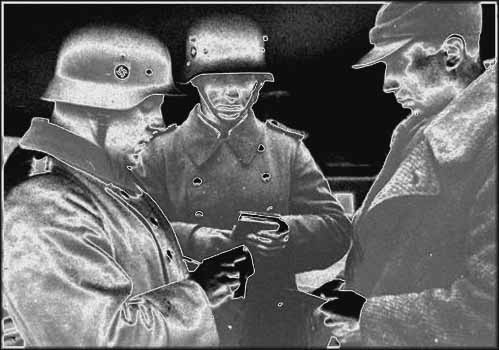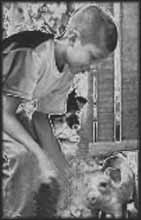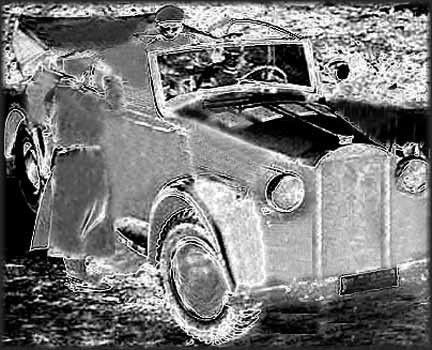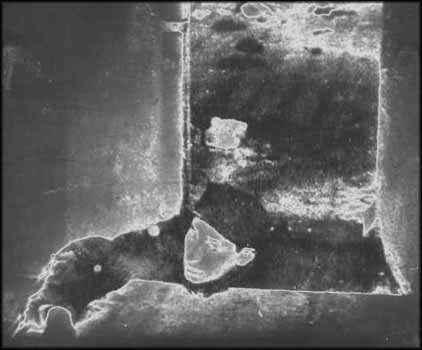
|
 | Before the war, my father Avraham Bretschneider was an egg dealer. He worked for a large company whose center of operations was not in Skala. In our town, there was an egg-collection center and those eggs would then be sent to Tarnopol or to Lvov. My father was a salesman for this company. I think that the owners were Jews. The company operated in Poland and also was in the export business. All of my siblings were still too young and they did not yet go to work. |
I studied in heder [religious school] in the afternoon and in the morning in a Polish school. There was no high school. There was only an elementary school, where the town's children studied.
When the war broke out in 1939, the Russians entered the city and gave the residents all kinds of certifications, according to the person's social class. My father was given the status of worker. Rich people were banished from the city.
I don't know how many Jews lived in Skala, but it was not a small community. There were Jews throughout the entire city center. Poles also lived there, but not too many. Most of the residents of the town were Ukrainians. The Poles, like the Jews, also lived close to the city center. The Ukrainians were farmers and they lived a little outside the city on their farms.
The relationship between the Poles, the Ukrainians, and the Jews was good. I was unaware of clashes or incidents raising fear. Maybe this was because I was still a child when the war started -- I was only eight years old.
Before the war, there was a club, a Zionist youth organization and my brother Hersh belonged to it. Then the Germans came and, of course, the situation deteriorated.
The economic situation was not that bad. The Jews didn't suffer, yet they did suffer. During the Polish period the economic situation had been much better, because most of the Jews were merchants. During the Russian period, there was a need for the Jews to find other kinds of work. There always was fear of selling things on the black market and sometimes the Russians randomly accused people of selling on the black market. There were already a lot of things that it was impossible to procure and, because of this, the black market flourished.
Only a few families fled with the Russians and went to Russia before the Germans arrived. We barely knew that there had been a Russian retreat when, suddenly, the Germans were almost upon us. Perhaps it was because of this that more people didn't flee. Also, no one really knew what was going to happen with the Germans.
 Custom House in Russia |
Until 1939, our town was a border town between Poland and Russia. When the Germans arrived in 1941, they guarded this border even though they occupied both sides of it. They didn't allow residents from either side to cross over the Zbrucz River. There was a German border patrol that lived in the city and, in addition to this, there was a Ukrainian police force.
The German border patrols had a few buildings and a large amount of land. They had a pig stable and they also had horses. There were two farms and a house that had once belonged to Jews. Actually, the Germans had three or four houses not far from one another. One was in a place that had been a lumberyard belonging to Jews and there the Germans had a horse stable. At another place there was a large house that also had belonged to Jews and there they kept the pig shed. Now that I recall, one of those places may have belonged to a rich Jew and been confiscated by the Russians when that Jew was banished from the town and the house became a public building.
We continued to live in the same place. They took Jews to work. First of all, there was established a kind of Judenrat, three or four Jews who acted as liason between the Germans and the Jewish community. The main function of the Judenrat was that the Germans would demand that they provide people for work details. They took Jews for all different kinds of work -- for example to clear the road of snow. From the very beginning, they also demanded workers for the farms that they had. I don't remember whether this was voluntary or whether the community decided who would go. In any event, my big brother Hersh went to work there, along with some other Jews. The same Jews worked on these farms for a long time; that is to say, they didn't switch them from day to day. I think that a few Poles also worked there.
There was no SS and the German authorities were not that strong. The more powerful authority, ironically, was the Ukrainian police force. There was no connection between the Ukrainian police and the German border patrol. I don't think that the Germans who were there had any [direct] contact with the war. If they did, they would have been taken to the front. They were older. They were almost uninvolved with the problem of the concentration camps or the work camps.
We hadn't heard about the concentration camps, but we did hear that in other cities the situation was much worse and that Jews were being deported. It was possible that those Germans in the border patrol knew the details but, in any event, this wasn't their function. What they did do was steal. From time to time they would rob the houses belonging to Jews. Jews no longer were allowed to own stores, but the Germans stole the merchandise from these stores or stole things from the houses. I don't know if there were other demands on the Judenrat. I wasn't involved in the relationship between the Judenrat and the Germans.
I don't remember if my father was working during this time. Most probably he worked any job that was sent his way by the Judenrat. It's difficult for me to tell you how the Jews made a living. There was no commerce and they didn't receive a salary for their work for the Germans.
The relationship of the Jews with the Poles and Ukrainians changed during this time -- especially with the Ukrainians, who enthusiastically supported the Germans because they were so opposed to the Russians. The Germans promised the Ukrainians that they would establish a Ukrainian government, which was the reason why the Ukrainians supported the Germans. The Ukrainians did not steal. Mostly it was the Germans who stole. They would steal valuables and then send them back to Germany.
 | Of course people were very afraid to be in the street when a German came by, especially a German officer. There was not as much fear of the regular German soldiers, who didn't do anything so bad. But the German officers would go out with dogs and if they saw a Jew with a beard, they would send the dog after him. Of course we were afraid of these dogs. |
We already had heard that in other cities there were pogroms and the Jews knew that it could happen in Skala. I don't know how seriously the Jews took this threat, but they knew it could happen some time soon in our town, because some time before the pogrom did occur, a Jewish patrol of sorts was established, a night watch. It was not official, but on every street there needed to be one person who would walk around so that in case something was happening, he would be able to alert us.
So the Jews organized themselves. Despite this patrol, however, the first pogrom came. It is interesting how it happened that the Jews knew there was going to be a pogrom. One of the Germans for whom the Jews worked -- a soldier in the border patrol -- came to us in the middle of the night. He knocked on the door and he asked for my brother Hersh, the one who worked for them. He told Hersh that something was not right at work and that he should come to the farm immediately. There was another Jew who also worked for the Germans and he lived outside of the town, about two kilometers away. A German also was sent to his house to tell him to come to work immediately, even though it was the middle of the night. We knew that something wasn't right.
 | We all got up and the Jew who was on guard duty in the area came at once to ask what was going on. We told him that someone had come to ask my brother Hersh to go to work immediately and that he needed to see what was going on. This information was passed from street to street and very quickly became known throughout the whole town. As for the Jew who lived outside the city, his in-laws lived in the city and he came to their house and said, "You see, they came and asked me to come. Something is not right. You need to be careful." Only after delivering this message did he to go the farm. |
It was already close to sunrise. Morning came and I said I would go to the farm with my brother and then I would return to tell everyone what was going on. At first, we were most worried about my brother's well being. In the end, my parents didn't allow me to go, but my brother went to the farm.
[Editor: The accuracy of Menachem Bartel's recollection of the inception of the first aktion is confirmed by the account in the Skala yizkor book: "We already had been warned by our neighbor Michael Jagendorf [sic], who worked in the pig sty of the Zollgrenzshutz [border patrol], that something was going to happen that night. He had been awakened by Wilhelm Feiffer, who had developed a liking for Michael and told him to go immediately to the farm under the pretext of taking care of the animals." Sefer Skala, p. 36]
As my brother Hersh approached the farm, he passed the house that was the headquarters of the Germans and where their dining room was located. But this house was not part of the farm. In order to get to the farm, he needed to go another couple hundred of meters. In front of the headquarters, a German guard always was stationed.
 | On the way, my brother met the second Jew who worked there [Editor: Michael Yagendorf] and when they approached the German guard, they saw that a private car also was approaching and that a German was getting out of the car. My brother or the other Jew said, "I think that Schultz is returning from his vacation." Schultz was one of the Germans who worked there and he had been on vacation and was supposed to return. My brother and the other Jew thought that they would go and help him with his luggage; but the German who was guarding outside said to them: "Don't go to the farm where you work. Climb up here into the attic." This was the house that served as the Germans' headquarters. They went inside this house and the German guard helped them to go up into the attic and told them not to come down. |
In the arriving taxi were the vanguard soldiers. Immediately afterwards there arrived more trucks, with soldiers armed with rifles. The trucks traveled slowly down the street and the soldiers jumped from the vehicles and assumed positions in the streets, across from the Jewish houses.
Everyone ran to find the hiding places in their homes that they had prepared ahead of time in case something like this happened. We had a cellar outside the house and also one inside the house, in the corridor, and it was possible to conceal this inside cellar from above. We closed the exit to the cellar and camouflaged it so that it was impossible to know that there was a cellar. Two families lived in the same house. The corridor connected the families and from there it was possible to go down into the cellar. We didn't think about it a lot but just went down into the cellar.
 | Our neighbor and my brother Aron stayed above. This neighbor had a father who lived in some village, but who had come to live with him during this German period. They stayed above in order to camouflage the cellar with the rug. It was a wooden floor and the door to the cellar also was wood and it was necessary to cover the wood with a rug so that the cellar would not be seen. They stayed, thinking they would climb up into the attic and hide either on the roof or in the attic. My brother Aron found a hiding place in the house, between two curtains. The walls were very thick and there were double windows because of the cold. |
It wasn't long before we heard shouts outside and knocking on the door. "Jews, open the door!" When they burst inside, at first they didn't find anyone. They were running right above our heads. We heard them go up to the attic and they foundt our neighbor and his father and took them outside. My brother Aron, who hid behind the curtains, was saved.
The pogrom continued for an entire day. Maybe it was a Sunday. Anyway, it was a [Jewish] holiday or just before a holiday. I remember this because enough food for a couple of days already had been prepared. My brother Aron lowered the food into the celler for us. [Editor: The first aktion in Skala began on Saturday morning, September 26, 1942, on the first day of Sukkot. Sefer Skala, p. 36]
Towards evening, I left the house in order to learn the fate of my big brother Hersh. It already was getting dark and I ran so that the goyim wouldn't see me. I ran straight to the farm. When I arrived, I asked a woman who was Ukrainian or Polish if she had seen my brother. She said, "I haven't seen him at all." I walked around the field and I called his name, but he didn't answer. I went to the other farm, but he was not there either, so I returned home.
When it became dark, my brother Hersh came home. He explained to us that he had been hiding in the house that was the Germans' headquarters. The people there hadn't wanted them to leave until it became dark, so it would not become known that they had saved Jews. The German soldiers intentionally had saved the lives of those two Jewish boys. The boys worked for them and the soldiers were happy with their work and wanted them to continue working for them. They must have known that other Jews would still be around, so perhaps they decided that they would specifically save these two Jews.
Frequently the Germans also received fairly big gifts from us -- things made of gold that someone who traveled [home] on vacation was able to give as a gift to his wife. Thus these Germans acted fairly nicely to the workers.
As to the people who were taken from the courtyard in trucks: We later heard that the Germans brought them to a place near Lvov, where there was a work camp. I don't think that any of them returned home. At least 80% of all of the town's Jews were taken in that first aktion.
I don't recall them killing any Jews on the spot during the progom. The entire pogrom centered around gathering the Jews and then transporting them. There were shots and beatings, but there were no killings during the pogrom. [Editor: According to the Skala yizkor book, thirty Jews were killed in Skala during the first aktion. Sefer Skala, p. 36.] It was not the same year that the Germans arrived, because my brother worked for the Germans for a long time. It is hard for me to say [exactly when], but it happened some time after they arrived. This first aktion didn't happen immediately.
|
The testimony of Menachem Bartel was taken in September, 1965, when he was interviewed in Tel Aviv by Miriam Tov.